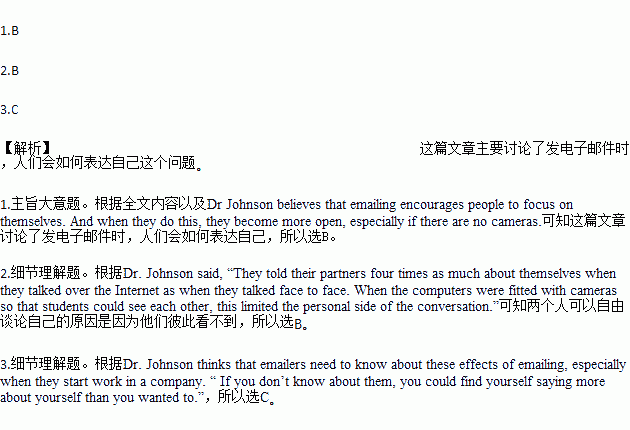题目内容
People tend to become more personal and hide less of themselves when using email. Researchers from Open University in Britain have found in a recent study that there are good reasons for this.
The team of researchers asked 83 pairs of students, all strangers to each other, to solve a problem. They had to discuss this question: If only five people in the world could be saved from a world disaster, who should they be? The pairs of students had to talk over the problem either face to face or by computers. Dr. Johnson said, “They told their partners four times as much about themselves when they talked over the Internet as when they talked face to face. When the computers were fitted with cameras so that students could see each other, this limited the personal side of the conversation.”
Generally the information was not extremely personal. It was mainly about things such as where they went to school, or where they used to live. But some students discussed their love stories, and personal childhood experiences.
Dr Johnson believes that emailing encourages people to focus on themselves. And when they do this, they become more open, especially if there are no cameras. “If you cannot see the other person, it becomes easier to talk about yourself. This is because you are not thinking what the other person is thinking of you. So emailing has become the modern way of talking,” said Dr. Johnson. However, this style of talking is not entirely new. “In the 19th century people started to use the ‘telegraph’ to communicate. Now the same kind of thing has happened and people ended up speaking more freely.”
Dr. Johnson thinks that emailers need to know about these effects of emailing, especially when they start work in a company. “ If you don’t know about them, you could find yourself saying more about yourself than you wanted to.”
1.The subject discussed in this passage is _______.
A. how people do research studies
B. how people open up when emailing
C. how to communicate at work
D. how to discuss and solve a problem
2.The reason that some couples talked freely about themselves is that _______.
A. they didn’t talk about very personal things
B. they couldn’t see each other
C. the cameras on the computers were turned on
D. they had to discuss a question
3.In the writer’s opinion, one should ______.
A. focus on oneself when emailing
B. talk more freely in emails than usual
C. consider how one uses email at work
D. discuss any subject that one wants to


 s not what I mean. You see I truly believe that all kids can learn. I believe it, I’ve seen it, and I’ve even _____it.
s not what I mean. You see I truly believe that all kids can learn. I believe it, I’ve seen it, and I’ve even _____it.